



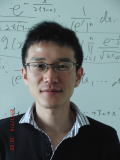
Masafumi HAYASHI
Assistant Professor,
University of the Ryukyus
(Oct 2010- )
Contact:
CREST Project Kohatsu Team, c/o Research Center for Finance, Ritsumeikan University
Postal Address: NojiHigashi 1-1-1, Kusatsu-shi, Shiga 5258577, Japan
Phone: +81 (0)77 5615074
FAX: +81 (0)775612801
Email: ![]()
How To Reach Us
| □ Members of Research Team |
Takashi TAMURA
Assistant Professor,
Department of Mathematical Sciences, Osaka Prefecture University
Group Leader
Arturo KOHATSU-HIGA
Professor,
Department of Mathematical Sciences
Ritsumeikan University
In addition, four researchers from Quantitative Research Center of Nomura Securities Co., Ltd.

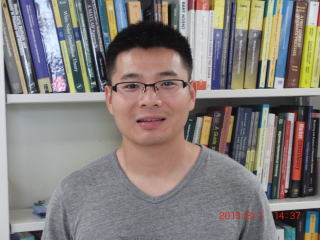
Jhong Zie
PostDoctoral Student
Ritsumeikan University
(Augest 2013- )

In CREST project, I am involved mainly in implementing computational algorithms
and conducting numerical simulations. In particular, I work on numerical
pricing models based on several classes of infinite-activity Lévy processes
and also on efficient computation of option Greeks using infinite-dimensional
analysis approach.
Currently, my research interest centers around on i) infinite-dimensional
analysis on Wiener-Poisson space; ii) stochastic time change; and iii)
nonlinear stochastic filterling theory. On more applied front, I am interested
in 1) pricing and hedging issues in volatility and correlation products
(esp., credit derivatives); ii) unified framework of equity/credit hybrid
derivatives pricing; and iii) calibration issues as inverse problem. On
self-made scientific computing, I try to enhance my skills in C/C++/Python
and to learn concurrent computing.
So far I have traversed several academic disciplines, and also, geographically, I have studied and worked at several places including Tokyo, Osaka, London, and Zurich.
Teppei OGIWARA
Osaka University
Researcher
(2013-)

Libo Li
Ritsumeikan University
PostDoctoral student
(Jan 2013- )
NGO Hoang Long
Assistant Professor
Hanoi National University of Education
Azmi MAKHLOUF
Tunis Al-Manar National Engineering School of Tunis
Assistant Professor
(2013-)
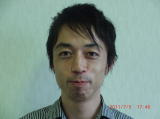
Masaaki FUKASAWA
Assistant Professor,
Graduate School of Mathematics,
Osaka Univeristy
I am interested in asymptotic behavior of functionals of stochastic processes.
Most recently, I obtained the following two different kinds of results:
(1) central limit theorem for discretization error of stochastic integrals; and
(2) perturbation expansions of the marginal distribution of additive functionals.
The former (1) proved stable convergence of the difference between a stochastic
integral and its Riemann approximation with a general stochastic partition,
which had been an open problem. The following applications were provided:
(i) central limiting theorem for realized volatility (interval estimation
method for volatility);
(ii) stable convergence of discrete hedging errors and construction of
asymptotically efficient (optimal) hedging strategies; and
(iii) asymptotic error analysis of the Euler-Maruyama approximation for
stochastic differential equations.
The latter (2) proved, in the context of mathematical finance, the validity
of asymptotic expansions of option prices which provide correction terms
in the Black-Scholes approximation. Several kinds of existing perturbation
expansions were unified in this general framework. In particular, the asymptotic
structure of implied volatility skew was clarified by giving an explicit
expression with the leverage effect and asymmetry property of jumps.
My research themes are numerical simulation methods for stochastic differential equations (SDEs) and the study of their properties.
In recent years, I have studied simulation methods for jump-type SDEs.
I have proposed, in particular, a new method using an operator splitting
method (Kusuoka approximation scheme) and conducted mathematical research on its related properties as well
as simulation study on its numerical behaviour. In addition, I am also
interested in applications of my research to credit risk modelling which
entails the concept of correlation.
In the domain of financial engineering, I have researched on computational
methods for risk quantities called Greeks. Especially, I conduct numerical simulations for jump-type models using
finite- or infinite-dimensional integration by parts formulae, and study
their precisions. I have also studied density functions of random variables
on Wiener spaces using an infinite-dimensional analysis method called Malliavin Calculus.
My original research domain is located in stochastic model and decision and game theory under uncertainty in Operations Research (OR). Researches in which I have been long involved (and am still interested) include stochastic dynamic optimisations of different stochastic systems using dynamic programming (reliability/maintainability/queuing, production/inventory) and stochastic comparison using stochastic ordering (stochastic dominance). Since I have been interested not only in the OR sphere but also in the broad research field of decision and stochastic dynamic optimisation under uncertainty, I have come to research economic and engineering problems in finance, initiated from topics such as portfolio selection and American-type option pricing and its optimal execution problems, which has become my main resarch field. More recent (collaborative) researches include optimal stopping problems related to real options, comparative statics of impacts of investing market participants' beliefs on and attitudes toward uncertainty in the future on equilibrium asset prices, applications of impulse control theory to optimisation of companies' dividend policies and stock buybacks, and pricing of interest-rate derivatives with the right of multiple exercises. Currently, I am interested in game-theoretical or mathematical-finance approaches to problems in corporate finance, optimal trading strategy adjusted for the market price impact, and valuation of credit portfolios with contagion effects of credit risks taken into account.
Akihiro TANAKA
Research Assistant
(Oct 2009-Mar 2010)
Yoshinori NAKANO
Research Assistant
(Oct 2009-Mar 2010)

| MSc. Students Hiroki Ichinari Tsubasa Inoue Dai Taguchi Seiya Tateiri Yuya Tanaka Shunsuke Iwamoto Ryo Matsuhata |
Go YUKI
PostDoctoral Student
Ritsumeikan University
(April 2013- )
Tomonori Nakatsu
Ritsumeikan University
PhD student( April 2011-)
1/ Research topics (key words)
Numerical probability, mathematical finance, stochastic analysis of discretizations, BSDEs (Backward Stochastic Differential Equations)
2/ Description of my research (basically, this is my PhD work)
- Study of the L2-time regularity of BSDEs with irregular terminal functions.
Application to the study of discretization errors (for BSDEs and for hedging strategies).
- Sequential Monte-Carlo method with application in credit risk.

I am currently interested in statistical inference for stochastic processes observed in discrete time. In particular, I have studied the volatility estimation in various different settings: (non-) parametric estimation, high-frequency data, jump-type processes. I have also studied the problem of discrete approximation of occupation time of diffusion process and its application in pricing some path dependent options like corridor and eddoko options.
I also interest in numerical simulation and computer programming.
In the past, I studied limit theorems for multivalued multiparameter processes.
Masamitsu OHNISHI
Professor, Graduate School of Economics, Osaka University
My main research theme is asymptotic inference for continuous-time stochastic
processes. Especially, I am interested in the parametric/nonparametric
inference and statistical model selection for jump-type processes from
discrete observations.
I am also interested in insurance mathematics in which jump-type models
are naturally employed. Recently, the analysis of the expected discounted
penalty function (Gerber-Shiu funtion), closely related to the evalution
of default probabilities and the option pricing, and the related statistical
inference issues are also hot topics.

| Mail to Adminitrator | Disclaimer | April 16 2010 |

My specialities are on probability theory and stochastic control. With regard to the research theme in CREST, I am interested in the importance sampling, a method for efficient numerical calculation of rare events. This method requires optimisation, and I think an optimisation method ordinarily used in a diterministic framework may be employed in a stochastic setting.
Kosuke OYA
Professor,Graduate School of Economics, Osaka University
Yasutaka SHIMIZU
Assistant Professor,
Graduate School of Engineering Sciences, Osaka University
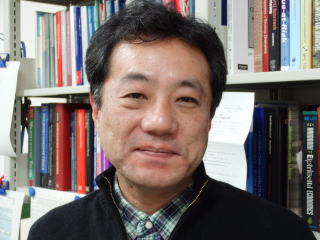

Hideyuki Tanaka
Ritsumeikan University
PhD student( April 2011-)
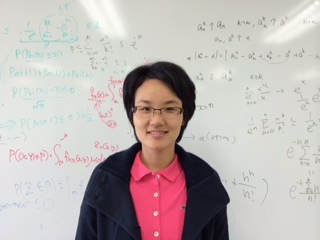
Song Xiaoming
PostDoctoral Student
Ritsumeikan University
(Augest 2013- )
Syota NAGAI
Takehiko YAMAGUCHI
Research Assistant,
Ritsumeikan University
(Apr 2010-March 2012)
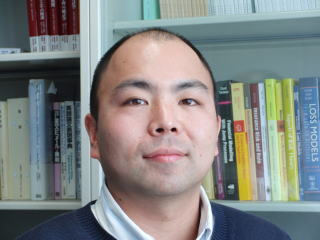
I research statistical inferences for diffusion processes defined by stochastic differential equations.
Especially, I am interested in the parameter estimation of diffusion process from discrete observations and its application to financial data.
There is a serious problem that the transition density function (likelihood function ) of diffusion process does not generally have an explicit form, which means that we cannot directly use likelihood analysis which is a very strong tool in statistical inferences.
I instead consider pseudo-likelihood analyses to obtain the asymptotic properties of both maximum likelihood-type estimators and Bayes-type estimators.
I am also interested in information criteria for model selection applied to diffusion processes.
Masayuki UCHIDA
Professor, Graduate School of Engineering Sciences, Osaka University


